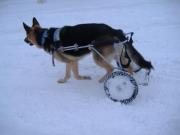 1st Annual Conference “Engaging with Eco-ability”
1st Annual Conference “Engaging with Eco-ability”University of Binghamton, New York
April 27 and 28, 2013
Theme: A Politics of Disability, Animal Liberation, and Queering
CALL FOR PAPERS & PRESENTATIONS
The 1st Annual Conference “Engaging with Eco-ability” will be hosted at Binghamton University April 27th & 28th, 2013. The conference will be organized and moderated by Anthony Nocella II and JL Schatz. This conference is to lay the groundwork for an edited book that’s part of the Critical Animal Studies series published by Lexington Books.
TO SUBMIT A PROPOSAL: Send an e-mail to ecoability@gmail.com with an abstract of around 300 words of your paper proposal for the conference. Also include a short biography between 100 to 120 words. Proposals will be accepted on a rolling basis and are due by NO LATER THAN March 23, 2013. The conference is divided into two days with slightly different, but interlinked, themes. The process of submission for both days are the same. Upon acceptance you will be informed of which day we feel your paper will best fit.
Day One: We are looking for papers and presentations concerning, but not limited to, the following 5 topics:
- Eco-Ability Intersectional Theories– We are looking for intersectional innovative liberatory theories between dis-ability studies, environmental ethics, critical animal studies, queer studies, critical race theory, transnational feminism, and other radical theories that promote activism.
- Activist Stories of exclusion of people with dis-abilities in the animal advocacy movement – What are the problems within the animal advocacy/liberation movement that create tension with dis-abled advocates? How can these problems be resolved? What animal advocacy campaigns, projects, events, protests, language, programs, organizations, theories, and practices are exclusionary and ableist to those with dis-abilities?
- Activist Stories of exclusion of animal advocacy/liberation in the dis-abilities rights movement – How are animal advocates excluded from discussion within dis-ability rights movement? How can these exclusions be resolved? What effective routes of activism can we take to create more effective coalitions between these two struggles? What dis-ability rights campaigns, projects, events, protests, language, programs, organizations, and practices are exclusionary and speciesist to those involved in the animal advocacy movement?
- Stories About Nonhuman Animals with Dis-Abilities – Increasingly nonhuman animals are finding themselves “put down” for having dis-abilities in a similar way as fetuses are being aborted for being abnormal. How is it that living with others with a dis-ability makes life so difficult that it justifies depriving the other of life? How is it that we define life and dis-ability? What does it mean to be a nonhuman animal with dis-abilities?
- Critiques of Service Nonhuman Animals and Animal Testing/Vivisection – Vivisection and service nonhuman animals are often touted as the “cure” for people with dis-abilities. What does it mean to try to “cure” dis-ability? Is what science does, such as testing on nonhuman animals, while searching for “cures” worth the cost? What is our responsibility to nonhuman animals in relation to people with dis-ability and vice versa?
Day Two: We are looking for papers and presentations concerning, but not limited to, the following 5 topics:
- Gender, Sexuality, Race and Eco-Ability Intersectional Theories– We are looking for radical intersectional innovative liberatory theories between dis-ability studies, environmental ethics, critical animal studies, queer studies, critical race theory, and feminism that promote activism, that challenges all domination and oppression.
- Activist stories of being included or excluded from the animal, dis-ability, and environmental movements – What are the problems within the animal, dis-ability, and environmental movements that creates tension between the different movements and advocates? How can these problems be resolved? How are these problems being solved? What animal, Earth, and dis-ability campaigns, projects, events, protests, language, programs, organizations, theories, and practices are exclusionary?
- Queer, feminist, and critical race activist stories of being included or excluded from the animal, dis-ability, and environmental movements – What are the problems within the animal, dis-ability, and environmental movements that creates tension with women and feminists? How can these problems be resolved? How are these problems being solved? What animal, Earth, and dis-ability campaigns, projects, events, protests, language, programs, organizations, theories, and practices are exclusionary to women and feminists?
- Earth, animal and dis-ability activist stories of being included or excluded from the queer and critical race movements – What are the problems within the animal, dis-ability, and environmental movements that creates tension with women and feminists? How can these problems be resolved? How are these problems being solved? What animal, Earth, and dis-ability campaigns, projects, events, protests, language, programs, organizations, theories, and practices are exclusionary to women and feminists?
- Earth, animal and dis-ability activist stories of being included or excluded from the queer theory, women liberation movements, and critical race theory – What are the problems within the animal, dis-ability, and environmental movements that creates tension with women and feminists? How can these problems be resolved? How are these problems being solved? What animal, Earth, and dis-ability campaigns, projects, events, protests, language, programs, organizations, theories, and practices are exclusionary to women and feminists?
___________________________________________________________
Sponsors: English Department, University of Binghamton, Institute for Critical Animal Studies, Students for Critical Animal Studies, and more to come.



Very interesting… things I hadn’t even considered. Unfortunately I’m down south. Would love to find our more about organizations and programs in my area that you guys work with.
I love your wordpress template, exactly where did you down load it from?